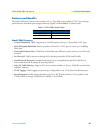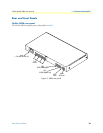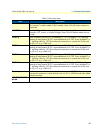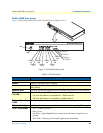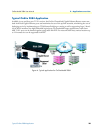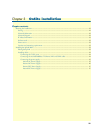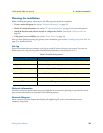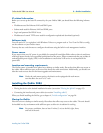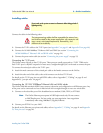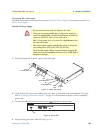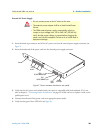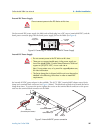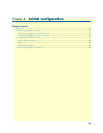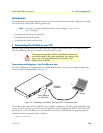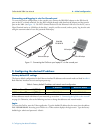
Installing the OnSite 2884 23
OnSite Model 2884 User Manual 3 • OnSite installation
IP related information
Before you can set up the basic IP connectivity for your OnSite 2884 you should have the following informa-
tion:
• IP addresses used for Ethernet LAN and WAN ports
• Subnet mask used for Ethernet LAN and WAN ports
• Login and password for PPPoE
Access
• IP addresses of central TFTP server used for configuration upload and download (optional)
Software tools
You will need a PC (or equivalent) with Windows Telnet or a program such as Tera Term Pro Web to config-
ure the software on your OnSite router.
You may also use a web browser to configure the software using the built-in web management interface.
Power source
If you suspect that your AC power is not reliable, for example if room lights flicker often or there is machinery
with large motors nearby, have a qualified professional test the power. Patton recommends that you include an
uninterruptible power supply (UPS) in the installation to ensure that VoIP service is not impaired if the
power fails.
Location and mounting requirements
The OnSite router is intended to be placed on a desktop or similar sturdy, flat surface that offers easy access to
the cables. Allow sufficient space at the rear of the chassis for cable connections. Additionally, you should con-
sider the need to access the unit for future upgrades and maintenance.
Note
Under the rack mount option, the chassis can be equipped with rack mount
ears that allow for use in a 19” rack.
Installing the OnSite 2884
OnSite hardware installation consists of the following:
• Placing the device at the desired installation location (see section “Placing the IpLink” on page 23)
• Connecting the interface and power cables (see section “Installing cables”)
When you finish installing the OnSite, go to chapter 4, “Initial configuration” on page 28.
Placing the OnSite
Place the unit on a desktop or similar sturdy, flat surface that offers easy access to the cables. The unit should
be installed in a dry environment with sufficient space to allow air circulation for cooling.
Note
For proper ventilation, leave at least 2 inches (5 cm) to the left, right, front,
and rear of the unit.



